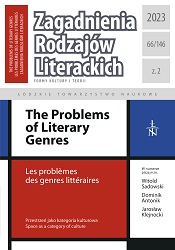Od praktykowania przestrzeni do tekstu. O projekcie eseistycznym Martina Pollacka
From Practicing Space to Text. On Martin Pollack’s Essay Project
Author(s): Andrzej JuchniewiczSubject(s): Geography, Regional studies, German Literature, Fascism, Nazism and WW II, History of the Holocaust, Theory of Literature, Sociology of Literature
Published by: Łódzkie Towarzystwo Naukowe
Keywords: Martin Pollack; necroviolence; practicing space; contaminated landscapes; Holocaust;
Summary/Abstract: The article’s author analyses the essays and reportages of Martin Pollack, which he considers interesting research material due to the writer’s past and topics related to environmental humanities and violence against Jews. In his work, Pollack reconstructs the Nazi past of his father and grandfather and traces moments of tension between Jews and Austrians and between members of his own family. In his project, a criticism of a society unaware of the consequences of youth radicalisation is adjacent to an analysis of situations in which the memory of the Holocaust has been repressed. Passivity manifests itself on many levels and concerns, not only the lack of reaction to the violence inflicted but also the failure to mark the places of mass extermination of Jews (the case of Rechnitz). Pollack’s essays concern the repressed memory of the Holocaust in Austria and the history of genocide traced from a post-anthropocentric perspective. The article’s author examines how the writer practices space and makes it cease to be only a stage of the events described. The practice of space allowed Pollack to propose the term “contaminated landscapes” which describes procedures for murdering victims in secluded places chosen for their proximity to swamps or special terrain. Its operability is justified on the condition that the claims of anthropomorphisation of the landscape are abandoned and included in the genocidal process as an accomplice. A more sensible procedure is to shift attention from the landscape to practices referred to as necroviolence. The perpetrators’ abandonment of funeral rituals and the abandonment of bodies in the pit include them in the circulation of matter in nature and indicate the violent nature of these practices. The author of the article checks the operability of the category “contaminated landscapes” and describes Pollack’s project as an auto/bio/geo/graphy (a term proposed by Elżbieta Rybicka), in which writing about one’s family forces one to take a position towards a place antagonising residents and complicating the biographies of individual members.
Journal: Zagadnienia Rodzajów Literackich
- Issue Year: 66/2023
- Issue No: 2
- Page Range: 155-170
- Page Count: 16
- Language: Polish

